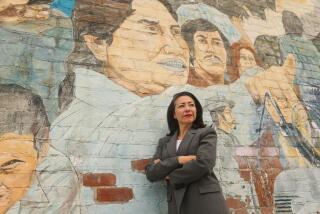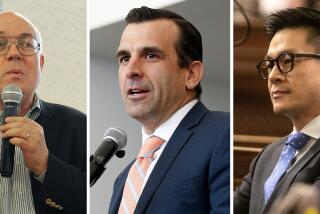Recall Will Test Political Power of Tax Revolt : Election: All five council members could be ousted in Tuesday’s vote. The outcome will be felt far beyond city limits, because many other communities have levied utility taxes and assessment districts.
- Share via
COVINA — In a special election expected to be watched closely by cities elsewhere in Southern California, the entire Covina City Council faces recall Tuesday after inaugurating a controversial utility tax.
The council approved the tax last summer when the city struggled with a $2.3-million budget deficit, and opposition has been building ever since. A grass-roots campaign gathered thousands of signatures to force all five council members into the recall election, rekindling some of the anti-tax sentiment of the Proposition 13 era. City officials are predicting a record turnout at the polls.
“It will sure send a message around to other communities who, depending on the outcome, may want to think twice whether they want to continue their political careers (before adopting a utility tax),” said Ron Roach, spokesman for the Sacramento-based California Taxpayers Assn. “The tax revolt is not dead.”
“Everyone’s watching us because this is somewhat of a test of whether city councils and communities are willing to support city services with a tax,” said Councilman John C. King.
Those leading the recall drive charge that the 6% utility tax would not be needed if the council had kept a tight rein on finances.
Council members defend the utility tax as the only way to maintain city services in the wake of a slump in sales tax revenue and the loss of property tax funds to the state. Changing the faces on the council, they say, would not make the city’s financial problems go away.
Mayor Henry Morgan and council members King, Chris Lancaster and Chris Richardson are on the recall ballot.
The seat of former Councilman Robert Biancardi, who resigned in April, is also up for recall. The council appointed Richard Gratton, who will be removed if voters recall Biancardi’s seat.
A simple majority of votes is needed to recall a council member. There are about 20,000 registered voters among Covina’s 43,000 residents. Already, an unprecedented number of absentee ballots--about 1,400--have been returned to City Hall. As of Friday, about 2,000 had been requested.
“This is a grass-roots effort--we want expenses cut first, whether the local, county, state or federal level,” said Earl P. Purkhiser, treasurer of Stop the Utility Tax Committee, which is leading the recall charge.
But the recall campaign has become more than a test of the utility tax. County business and environmental leaders are watching closely to see if Covina Mayor Henry Morgan, one of four city representatives on the board of the South Coast Air Quality Management District, is ousted. If he is, he loses his spot on the 12-member AQMD board.
Morgan has been targeted by businesses who charge he is too tough on them, and by environmentalists who say he is too lax.
“I’ve got more baggage than the other council members, and I’m the one with special-interest groups from the outside trying to nail me,” Morgan said.
“Every city is watching this election, and it means a lot to me,” he said.
He noted that Covina’s utility tax since it took effect in November already has bolstered the general fund by about $1.4 million, and city officials expect it to raise $2.6 million this year. Without it, he said, the city would have to cut that much in police, fire, library and other services.
The tax shows up on gas, electricity, water and telephone bills. The average household in Covina pays about $12.60 a month in the utility tax, with exemptions for low-income families.
Covina is one of 13 cities in the San Gabriel Valley that have adopted a utility tax. Though others, such as neighboring West Covina, have vowed not to adopt the tax, almost all have increased fees or cut services to compensate for budget shortfalls, and most have tacked assessment fees onto property tax bills to pay for upkeep of everything from street lighting to road medians. Assessment districts, too, are beginning to spark the ire of residents who say cities are unfairly avoiding restrictions on new taxes imposed by Proposition 13, the 1978 taxpayer-revolt initiative.
Utility taxes have been around for years, but cities have turned to them increasingly in the recession.
Besides Covina, five other San Gabriel Valley cities--Azusa, Claremont, Covina, San Marino and South Pasadena--have adopted utility taxes within the past year.
The cities of El Monte, Monterey Park, Pomona, Pasadena, Alhambra, Arcadia, Baldwin Park and Irwindale have utility taxes, and so does the county, which has levied a utility tax in unincorporated areas since 1991.
Sierra Madre officials say they are seriously considering a utility tax, which has drawn little opposition so far.
But opposition has sprouted along with the taxes.
In 1987, Baldwin Park voters ousted two council members in a recall campaign sparked by protests against the city’s 5% utility tax.
Recall efforts have succeeded elsewhere in the state, where about one-quarter of all cities have a utility tax. In the Northern California cities of Pacifica and Morgan Hill, voters angered by utility taxes and assessments have recalled seven council members.
In Pacifica, voters recalled four of five council members last March, sparing only one councilwoman who opposed an assessment fee.
In December, 1991, Morgan Hill voters irate over a 9% utility tax ousted three council members in a recall drive.
Recall drives are “very sobering,” West Covina Councilwoman Nancy Manners said. “I think (the Covina election) could influence future decisions if someone on our council decides to (propose a utility tax).”
The recall drive in Covina has been led by two groups. Stop the Utility Tax Committee has raised about $8,000 and has nearly 250 volunteers who are distributing leaflets, going door-to-door and sending out mailers to oust the council.
Covina Citizens for Good Government, led by longtime residents William Mason and Cody Cluff--the latter has organized opposition in the business community--has raised about $5,000. The group formed to oust Morgan but has joined in the recall effort against the entire council.
As of late last week, council members Morgan, King, Lancaster and Richards together had collected about $26,000 in campaign contributions. Gratton had not filed campaign contribution reports.
If Covina voters recall a majority of the council members, a special election to fill those vacancies will take place Oct. 12. Voters will decide by answering a separate question on the ballot whether the remaining council will appoint new members if a minority, or fewer than three members, are recalled, or whether a special election should be called even if only one or two members are ousted.
If one or two are recalled and voters opt for a special election to fill those vacancies, the special election will be either Oct. 19 or Oct. 26, according to City Clerk Joey Southall.
Each special election would cost the city between $40,000 and $50,000, Southall said.
More to Read
Sign up for Essential California
The most important California stories and recommendations in your inbox every morning.
You may occasionally receive promotional content from the Los Angeles Times.










